

99 Resources to Research & Mine the Invisible Web. College researchers often need more than Google and Wikipedia to get the job done.
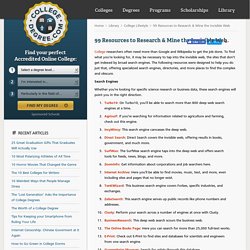
To find what you're looking for, it may be necessary to tap into the invisible web, the sites that don't get indexed by broad search engines. The following resources were designed to help you do just that, offering specialized search engines, directories, and more places to find the complex and obscure. 50 Cool Search Engines for Serious Readers. The Internet has proven itself as a valuable resource for all types of readers, from collectors of rare books to tech-minded readers who shop, network and download books online.

But if you’re having trouble finding exactly what you need, whether it’s a book review, a book by a certain author, or a digitized anthology for your class at an online college for creative writing, you’ll want to use sophisticated tools that direct you to high-quality resources. 100 Time-Saving Search Engines for Serious Scholars. While burying yourself in the stacks at the library is one way to get some serious research done, with today’s technology you can do quite a bit of useful searching before you ever set foot inside a library.

Undergraduates and grad students alike will appreciate the usefulness of these search engines that allow them to find books, journal articles and even primary source material for whatever kind of research they’re working on and that return only serious, academic results so time isn’t wasted on unprofessional resources. Note: Visit our updated list for the latest in academic search engines.
General Start off your research with one of these more general academic search engines. Intute: Use this website’s search tools to find the best and most reliable sites to start your research. Discover over 70,000+ databases and specially search engines. Invisible Web. From Wikipedia, the free encyclopedia.
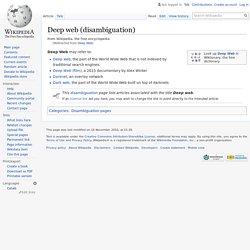
Libdex – Worldwide index of library catalogues, libraries & books. The Invisible Web. How Deep Is The web. Les bases de données gratuites. Près de 20 ans après sa création, le répertoire de bases de Données grAtuites Disponibles sur Internet ferme ses portes.
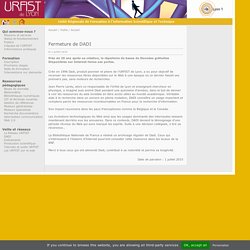
Crée en 1996 Dadi, produit pionnier et phare de l’URFIST de Lyon, a eu pour objectif de recenser les ressources libres disponibles sur le Web à une époque où ce dernier faisait ses premiers pas, sans moteurs de recherches. Jean Pierre Lardy, alors co-responsable de l’Urfist de Lyon et enseignant chercheur en physique, a imaginé puis animé Dadi pendant une quinzaine d’années, dans le but de donner à voir les ressources du web invisible en libre accès utiles au monde académique. Véritable aide à la recherche dans un univers en pleine mutation, DADI connaîtra un usage important et comptera parmi les ressources incontournables en France pour la recherche d’information. Son impact rayonnera dans les pays francophones comme la Belgique et le Canada. La Bibliothèque Nationale de France a réalisé un archivage régulier de Dadi. Invisible Web: What it is, Why it exists, How to find it, and Its inherent ambiguity.
What is the "Invisible Web", a.k.a. the "Deep Web"?
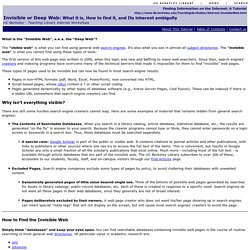
Ipl2: Information You Can Trust. Reference. Invisible web invisible. ePagini News, Articles,Opinions and Reviews. The Ultimate Guide to the Invisible Web. Search engines are, in a sense, the heartbeat of the internet; “Googling” has become a part of everyday speech and is even recognized by Merriam-Webster as a grammatically correct verb.
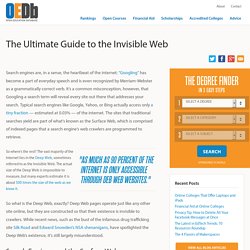
It’s a common misconception, however, that Googling a search term will reveal every site out there that addresses your search. Typical search engines like Google, Yahoo, or Bing actually access only a tiny fraction — estimated at 0.03% — of the internet. The sites that traditional searches yield are part of what’s known as the Surface Web, which is comprised of indexed pages that a search engine’s web crawlers are programmed to retrieve. "As much as 90 percent of the internet is only accessible through deb web websites. " So where’s the rest? Deep Web Technologies' Federated Search.
The Best Reference Sites - Find the Best Reference Sites on the Web. Whether you're looking for the average rainfall in the Amazon rainforest, researching Roman history, or just having fun learning to find information, you'll get some great help using my list of the best research and reference sites on the Web. About.com: I've found many answers to some pretty obscure questions right here at About.Reference.com.Extremely simple to use, very basically laid out.Refdesk.com.Includes in-depth research links to breaking news, Word of the Day,and Daily Pictures.
A fun site with a ton of information.Encyclopedia.com. As stated on their site, Encyclopedia.com provides users with more than 57,000 frequently updated articles from the Columbia Encyclopedia, Sixth Edition.Encyclopedia Brittanica. One of the world's oldest encyclopedias online.Encarta.Put together by Microsoft. I like Encarta because it's very easy to use.Open Directory Reference. The Invisible Web. What is the Invisible Web?
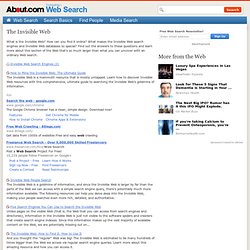
How can you find it online? What makes the Invisible Web search engines and Invisible Web databases so special? Find out the answers to these questions and learn more about this section of the Web that's so much larger than what you can uncover with an ordinary Web search. Invisible Web Directory - Search The Invisible Web With A Web Directory. 10 Search Engines to Explore the Invisible Web. Invisible Web Gets Deeper. By Danny Sullivan From The Search Engine Report Aug. 2, 2000 I've written before about the "invisible web," information that search engines cannot or refuse to index because it is locked up within databases.
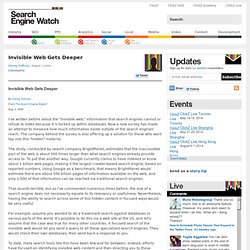
Now a new survey has made an attempt to measure how much information exists outside of the search engines' reach. The company behind the survey is also offering up a solution for those who want tap into this "hidden" material. The study, conducted by search company BrightPlanet, estimates that the inaccessible part of the web is about 500 times larger than what search engines already provide access to. To put that another way, Google currently claims to have indexed or know about 1 billion web pages, making it the largest crawler-based search engine, based on reported numbers. That sounds terrible, but as I've commented numerous times before, the size of a search engine does not necessarily equate to its relevancy or usefulness.
Now let me make one final distinction. BrightPlanet.